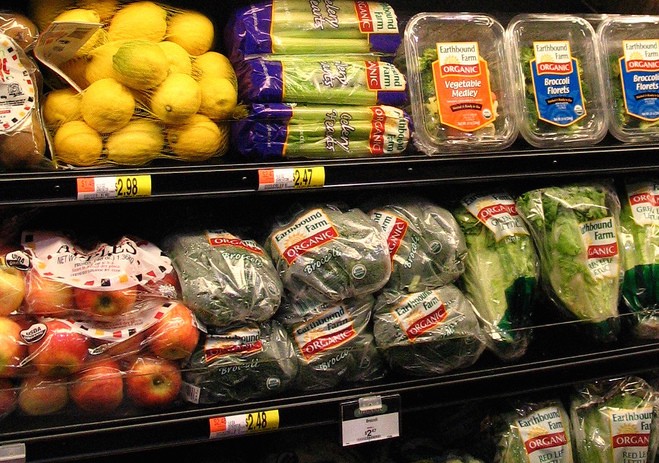The Organic Luxury Tax

It’ll come as no surprise to most shoppers that organic produce is typically more expensive than the other options. In March, a Consumer Reports analysis found that, on average, the prices on organic foods were 47% higher than on their conventional counterparts. USDA numbers bear out this difference too. The wholesale price of a 25-pound sack of organic carrots in San Francisco in 2013, for example, was more than three times the price of a conventional bag.
(It’s worth noting that not all items see such drastic markups all the time: Three-pound cartons of mesclun were only 23% more expensive, according to the USDA, and sometimes organic produce is actually the less expensive option — but that’s a rarity.)
But this price difference does not just reflect the added cost of organic agriculture techniques: It’s also because people will pay more for the label — often without knowing what it means. “Organic” has essentially become another way of saying “luxury.”
Deena Shanker at Quartz argues that we’re all wasting money by buying organic produce at the supermarket, because organic produce isn’t necessarily better for the environment, the health and nutritional benefits are very small compared to conventional produce, and workers on organic farms aren’t treated better. Plus, the “dirty dozen” vegetables aren’t as dirty as we think they are (“scientists from the University of California published a report finding that even the fruits and vegetables in the Dirty Dozen had less than 2% of the maximum allowable amount of the measured pesticides established by the US Environmental Protection Agency”).
But that doesn’t mean we shouldn’t think about the kind of produce we should buy; Shanker says if you have been spending more on organic produce, the better thing to do is to buy your produce at local farmer’s markets. You’ll get fresher, in-season veggies, plus knowledgable farmers who can tell you everything you’d ever want to know about what you’re buying.
Photo: Walmart Organic Produce
Support The Billfold
The Billfold continues to exist thanks to support from our readers. Help us continue to do our work by making a monthly pledge on Patreon or a one-time-only contribution through PayPal.
Comments